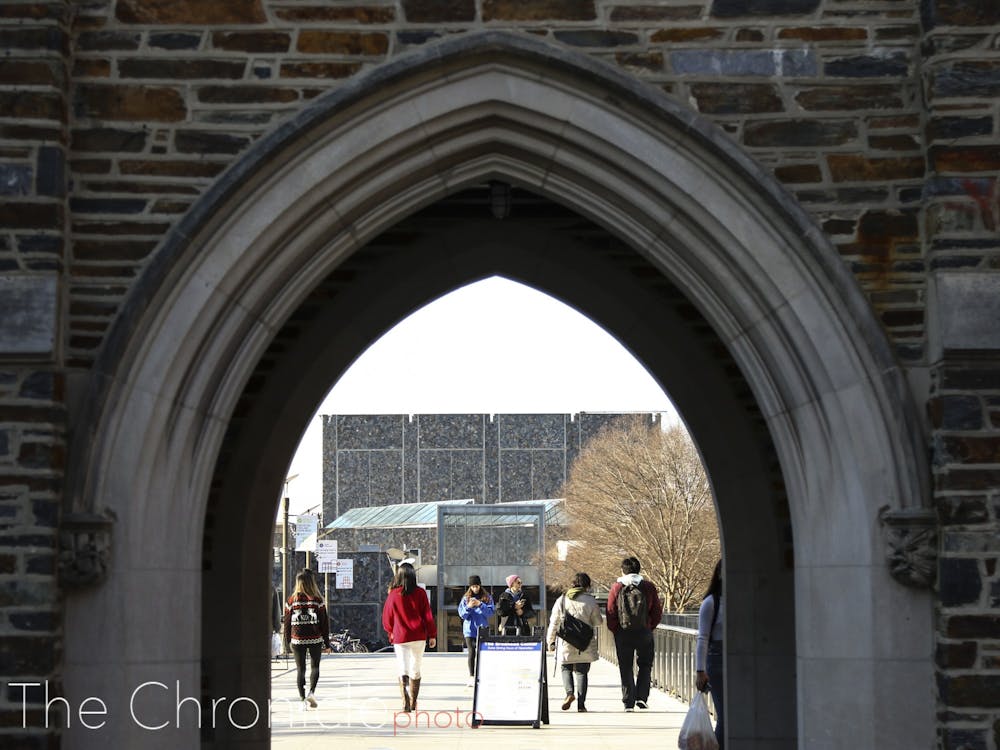Black faculty and staff came together Tuesday to discuss Duke’s history with the Black community and share personal stories of living while Black, while President Vincent Price spoke about improving Duke’s work of promoting racial equity and justice.
The session, titled “How Did We Get Here?,” opened “Living While Black,” a Duke-sponsored virtual event featuring a variety of speakers from the Black community at Duke. The event was organized by the Office of the Vice Provost for Faculty Advancement and the Office for Institutional Equity.
Kicking off the event, Kimberly Hewitt, vice president for institutional equity, recognized Duke’s complicated history.
“Throughout the history of the United States, Black Americans have weathered the storm of oppression, from slavery to reconstruction, Jim Crow, segregation, mass incarceration, housing, economic and health inequities and disenfranchisement,” Hewitt said. “Likewise, Duke's history is littered with echoes of these same oppressions: founder and president who owned slaves, its existence as a once-segregated college for white men, the presence of confederate statues, resistance to integration and a troubled relationship with the Durham community.”
She added that despite this, she sees a “desire and energy for change” that renders her hopeful for progress.
President Vincent Price spoke at the session, giving a commitment to listen; personally transform; and, eventually, institutionally transform.
“Here at Duke we aspire to be an agent of progress, advancing racial equity and justice,” he said. “But it would be more than fair to say that we have often not fully embraced that mission. Our history makes that clear. And I think we'll hear today that our present also makes that clear.”
Price emphasized the importance of action to commit to an anti-racist mission in order to become “a better and more perfect vision.”
“My guess is that we don't need another task force. Indeed, the three trustee-level task forces were already launched, one examining Duke and Durham, today and tomorrow, one focusing on climate and sustainability, one focusing on Duke’s centennial—each will certainly provide us real opportunities to advance our mission in this regard,” Price said. “But I also think we should look back on the many prior studies and task forces, stretching back decades. We know what to do. We just have to care enough to do it.”
Professor of Pediatrics Delbert Wigfall added a personal narrative to the conversation by sharing his experiences with discrimination. Though he had grown up in a tight-knit community “seeped in religion and a sense that [he] would succeed in life,” that world of safety was shattered when he turned 10.
“I was afraid to sleep near windows, my bedroom was near the front of the house because we had been informed that marauding [Ku Klux Klan] members were threatening to shoot into our homes. I slept on the floor that night,” he recalled.
The fear would mount over the years, watching the assassination of many of his heroes including John Kennedy and Malcolm X, death threats against the Obama family following his inauguration, the proliferation of hate groups in the United States, COVID-19’s disproportionate effects on persons of color and the killings of George Floyd, Breonna Taylor and Ahmaud Arbery.
“Personally knowing what it's like to walk in fear of death—literally—how can I not understand the pain and anger that has resulted in demonstrations?” Wigfall remarked. “Demonstrations have been the American way, and occasionally they have turned violent, like the Boston tea party. I have never condoned violence. I grew up in an era of civil rights and leadership of Martin Luther King, yet I understand, I hurt in ways that have no expression.”
Associate Professor of History Adriane Lentz-Smith highlighted the racial story of Hurricane Katrina, noting that of the thousands displaced by the storm, Black people were the hardest hit.
“Katrina was a crystalline moment for me when what I knew intellectually as a historian collided with what I felt achingly as a Black American, that in the aggregate, in the United States, Black lives counted for less, were valued less and that Black citizenship remained conditional,” she said.
She emphasized that the answer to how we got to the present moment is because of how the race problem is treated in America as a problem with Black people rather than the country’s commitment to racialized power.
“In historian-speak, we would talk about this as sort of a matter of white supremacy—as a system of political economy with an ideological argument embedded and of settler colonialism, which is both a set of actions and an assertion of white racial destiny. Those two things together have sort of produced and shaped the history of the United States as it has unfolded. This is the concise answer,” she said.
The longer answer, she said, involves the Morgan thesis, which argues that the expansion of freedoms for Americans of European descent was contingent on “unloading the freedom” in the bodies of people of African descent, Jim Crow-era attacks on Black citizenship and a system that absolves people of their responsibility for the ways in which they benefit from the perpetuation of inequalities.
Lentz-Smith also shared the story of Henrietta Wright, a Black woman in Winona, Miss. who, in August 1965, went to register to vote just as the Voting Rights Act was passed. As she was driving back from putting her name on the voter polls, she was followed home by a deputy from the county sheriff’s department who then arrested her for allegedly running a stop sign, dragged out of her business establishment and beat her on the lawn. She was taken to the county jail where she was beaten more and declared mentally unfit.
“In some ways you tell the story and people think, ‘Oh, well, it's Mississippi, right, and everybody knows that Mississippi is a problem.’ But Mississippi is America, right? It might be America in the extreme in the 1960s, but Mississippi is America,” Lentz-Smith said.
She emphasized that the country’s task now and going forward is to make sure that its expressions of concern, willingness to listen and regret for the past are “more than just conscience pay.” This, she said, is our responsibility as citizens and members of the Duke community and the U.S.
Jay Pearson, assistant professor in the Sanford School of Public Policy, closed the session with an introduction to structural racism, which he defined as “macro-level processes associated with racial construction, racial hierarchy or stratification, as well as racial bias” that are central features of the U.S. social landscape and “inextricably linked to U.S. national identity.”
He outlined the solution to combating structural racism: committing to policy-making that dismantles these systems.
“The work… is not just to document racialized differences in outcomes and proximal or simple explanations for why those exist—but to work towards understanding the fundamental drivers of these differences as multiple core social processes representing the differential valuation of human populations and then to act decisively with policy decision-making in the effort to make this work,” Pearson said. “Without that level of action, we're only explaining away [the] phenomenon that many of us who are living this already understand really well.”
Correction: An earlier version of this article misspelled Breonna Taylor's name as "Breanna Taylor." The Chronicle regrets the error.
Get The Chronicle straight to your inbox
Signup for our weekly newsletter. Cancel at any time.

Preetha Ramachandran is a Trinity senior and diversity, equity and inclusion coordinator for The Chronicle's 118th volume. She was previously senior editor for Volume 117.

